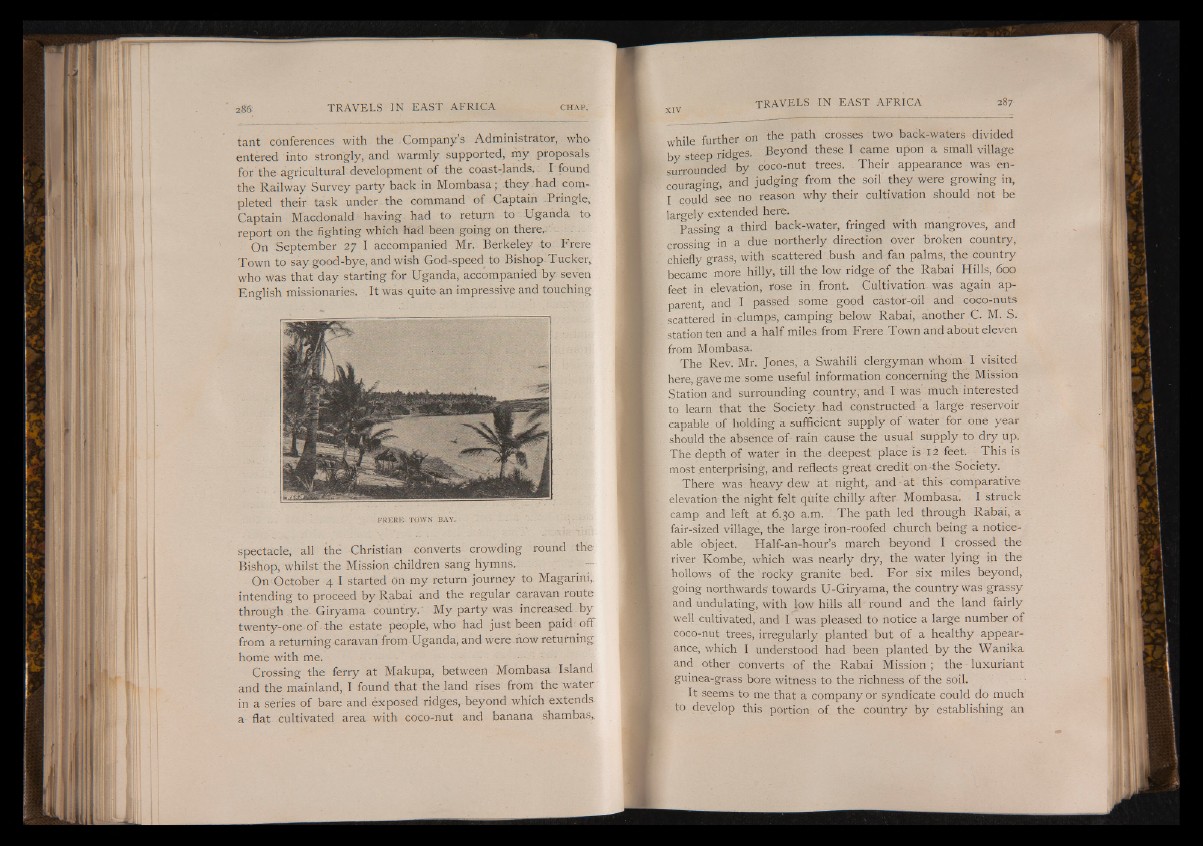
tant conferences with the Company’s Administrator, who
entered into strongly, and warmly supported, my proposals
for the agricultural development of the coast-lands.: I found
the Railway Survey party back in Mombasa; they.had completed
their task under the command of Captain Pringle,
Captain Macdonald having had to return to Uganda to
report on the fighting which had been going on there..
On September 27 I accompanied Mr. Berkeley to Frere
Town to say good-bye, and wish God-speed to Bishop. Tucker,
who was that day starting for Uganda, accompanied by seven
English missionaries. It was quite-an impressive and touching
FRERE TOWN BAY.
spectacle, all the Christian converts crowding round the
Bishop, whilst the Mission-children sang hymns.:
On October 4 I started On my return journey to Magarmi,
intending to proceed by Rabai and the regular caravan route
through the-Giryama country. My party was increased by
twenty-one of the estate people, who had just been paid'off
from a returning caravan from-Uganda, and were now returning,
home with me.
Crossing thè ferry at Makupa, between Mombasa Island
and the mainland, I found that the land rises from the water
in a series of bare andèxposed ridges, beyond which extends-
a flat cultivated area with coco-nut and banana shambas,
while further on the path crosses two back-waters divided
b steep ridges. Beyond these I came upon a small village
s u r r o u n d e d by coco-nut trees. Their appearance was encouraging,
and judging from the soil they were growing in,
I could see no reason why their cultivation should not be
largely extended here.
Passing a third back-water, fringed with mangroves, and
crossing in a due northerly direction over broken country,
chiefly grass, with scattered bush and fan palms, the country
became more hilly, till the low ridge of the Rabai Hills, 600
feet in elevation, rose in. front. Cultivation-was again apparent,
and I passed some good castor-oil and coco-nuts
scattered in clumps, camping below Rabai, another C. M. S.
station ten and a half miles from Frere Town and about eleven
from Mombasa.
The Rev. Mr. Jones, a Swahili clergyman whom I visited
here, gaye me some useful information concerning the Mission
Station and surrounding country, and I was much interested
to learn that the Society had constructed a. large-reservoir
capable of holding a sufficient supply of water for one year
should the absence of rain cause the usual supply to dry up.
The depth df water in the deepest place is 12 feet. This is
most enterprising, and reflects great credit on The Society.
There was heavy dew a t night, and - at this comparative
elevation- the. night felt quite chilly after Mombasa. I struck
camp and left at .6.30 a.m. The path led through Rabai, a
fair-sized village, the large iron-roofed church being a noticeable
object. Half-an-hour’s march beyond I crossed the
river Kombe, which was nearly dry, the water lying in the
hollows of the rocky granite bed. For six miles beyond,
going northwards towards U-Giryama, the country was grassy
and undulating, with low hills all round and the land fairly
■ well cultivated, and I was pleased to notice a large number of
coco-nut trees, irregularly planted but of a healthy appearance,
which I understood had been planted by the Wanika
and other converts of the Rabai Mission; the luxuriant
| guinea-grass bore witness to the richness of the soil.
It seems to me that a company or syndicate could do much
to develop this portion of the country by establishing an